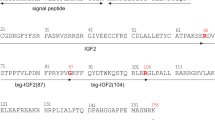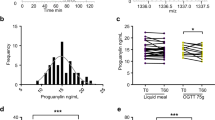Abstract
We have compared the expression of insulin-like growth factors (IGFs) and IGF binding proteins (IGFBPs) in ten paired samples of normal and tumour colonic tissue with regard to both mRNA and protein. We have compared sensitivity of these tissues to IGF-I using primary cultures of epithelial cells of colonic mucosa, and we have examined the production of IGFs and IGFBPs by these cells. In the tissues, IGFBP-2 mRNA was expressed in all normal and cancer samples but other IGFBPs showed variable expression. mRNAs for IGF-I were expressed in all normal and cancer tissues but IGF-II mRNA was only detected in cancer tissue (3 out of 10). Immunostaining of sections of normal and cancer tissue was negative for IGF-I and IGF-II; IGFBP-2 was positive in 2 out of 10 cancer tissues and 7 out of 10 normal tissues; IGFBP-3 was positive in 7 out of 10 cancer tissues and 7 out of 10 normal tissues; and IGFBP-4 was positive in 5 out of 10 cancer tissues and 6 out of 10 normal tissues. In the cells in culture, cancer cells showed increased incorporation of [35S]methionine into protein and [3H]thymidine into DNA (P < 0.02) when treated with IGF-I. Western blotting of serum-free conditioned media from cells in culture showed that 8 out of 10 normal and 3 out of 10 cancer cultures produced a 32-kDa immunoreactive IGFBP-2. No IGFBP-3 was secreted by any culture but 24-kDa IGFBP-4 was found in 3 out of 10 normal and 5 out of 10 cancer tissues. Because of the discrepancy between mRNA and protein expression for IGFBP-2, degradation of native IGFBPs was assessed using tissue extracts. Colon cancer extracts were able to degrade exogenous IGFBP-2, IGFBP-3 and IGFBP-4, whereas normal tissue extracts were without effect on IGFBP-2. We conclude that IGFBPs are synthesized and secreted by cells of the colonic mucosa but that proteolysis of secreted IGFBP-2 occurs in colon cancer tissue. This selective degradation may confer a growth advantage.
This is a preview of subscription content, access via your institution
Access options
Subscribe to this journal
Receive 24 print issues and online access
$259.00 per year
only $10.79 per issue
Buy this article
- Purchase on Springer Link
- Instant access to full article PDF
Prices may be subject to local taxes which are calculated during checkout
Similar content being viewed by others
Author information
Authors and Affiliations
Rights and permissions
About this article
Cite this article
Michell, N., Langman, M. & Eggo, M. Insulin-like growth factors and their binding proteins in human colonocytes: preferential degradation of insulin-like growth factor binding protein 2 in colonic cancers. Br J Cancer 76, 60–66 (1997). https://doi.org/10.1038/bjc.1997.337
Issue Date:
DOI: https://doi.org/10.1038/bjc.1997.337
This article is cited by
-
IGFBP-2 - taking the lead in growth, metabolism and cancer
Journal of Cell Communication and Signaling (2015)
-
Insulin like growth factor binding protein 4 promotes GBM progression and regulates key factors involved in EMT and invasion
Journal of Neuro-Oncology (2014)
-
Inducing apoptosis of human colon cancer cells by an IGF-I D domain analogue peptide
Molecular Cancer (2008)
-
Endostatin expression in pancreatic tissue is modulated by elastase
British Journal of Cancer (2005)
-
A case of colorectal carcinoma in adenoma analyzed by a cDNA array
International Journal of Colorectal Disease (2005)



